September 2024, Zadar, Croatia
On 19-20 September, the CEELI Institute, in partnership with the Croatian Judicial Association, hosted a conference in Zadar on the importance of promoting the rule of law. In Croatia, judges face low public perception and understanding of key issues of the rule of law and the importance of an independent judiciary. The event focused on addressing these key challenges, with input shared by Croatian experts and judges from Poland, Lithuania, Slovenia, and Kosovo.
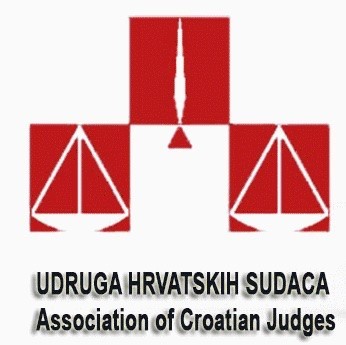
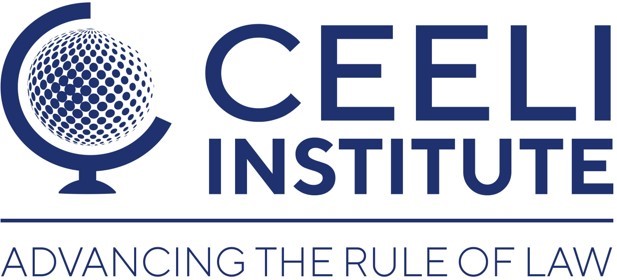
The program was opened by Croatia’s Minister of Justice, Public Administration, and Digital Transformation, Damir Habijan, who emphasized the importance of the rule of law as a fundamental pillar of the European Union. Damir Kontrec, President of the Croatian Judicial Association, along with Krystian Markiewicz, President of the Polish Association Iustitia, and Vesna Bergant Rakocevic, President of the Slovenian Association of Judges, shared lessons learned on improving public trust in the judiciary.
In his keynote, Đuro Seesa, President of the International Association of Judges, urged judges to speak out in defense of the rule of law when necessary, a sentiment echoed by Senior Croatian Supreme Court Judge Ileana Vinja, who stressed the importance of communication skills in modern-day judiciary work: “I thought we had to speak through our decisions, but those are bygone days. We know the law, but we are not trained in communication; therefore, we need the help of real communication experts who know how to communicate. It is important for us to start building partnerships and make some changes in our approaches. We may not reap the fruits of our efforts now, but our successors will, and that’s important”.
At CEELI Institute’s Judicial Conference in Zadar, co-organized with the Croatian Judicial Association, participants and experts tackled the critical challenges facing the judiciary in Central and Eastern Europe, from financial strains to strategic communication.
Ksenija Renko, Strategic Communications Consultant and director at Jupiter Strategic Consulting, urged strategic communication: “The Croatian judiciary faces significant public challenges that should be effectively managed by good communications practices. Substantial deficiencies in how Croatian judges and courts present themselves to the public have inevitably led to a negative perception of the judiciary, as evidenced by recent research. Citizens often struggle to understand judicial decisions and processes, resulting in misinterpretations and reinforcing skepticism about the impartiality of the judiciary. Lack of understanding is often magnified by how the news media portrays the courts and judicial decisions. This situation underscores the need to improve how courts communicate with the public. It is vitally important for the Croatian judiciary to implement strong strategic communications practices. Utilizing best practices in communications will promote respect for the judiciary, help the public understand the importance of judicial independence, educate people on how courts work and help them understand court processes, address the current negative public perception of the judiciary, and, importantly, build public support for important goals of the judiciary. There may be nothing more important to the judiciary than public trust. Without public trust, nothing can be accomplished. Judicial independence and sufficient funding for the courts depend on public trust, and public trust can be strengthened significantly by implementing a good strategic communications plan.”
Danguolė Bublienė, President of Lithuania’s Supreme Court, stressed the link between judicial independence and fair remuneration, while Bartłomiej Przymusiński of the Polish Judges Association IUSTITIA advocated for unity and visibility: “Be associated, be visible in the media, build coalitions, and always be prepared for a crisis.” Human rights lawyer Marcin Mrowicki emphasized the need for judges to stay connected to society, referencing Europe’s standards and Israel’s protests against judicial overreach. Slovenia’s Judge Vesna Bergant-Rakocevic highlighted how cooperation between judicial bodies led to pay increases for judges. Ioanna Lachana, Head of Communication at the EU Special Representative in Kosovo, underscored the need for transparency and public engagement.
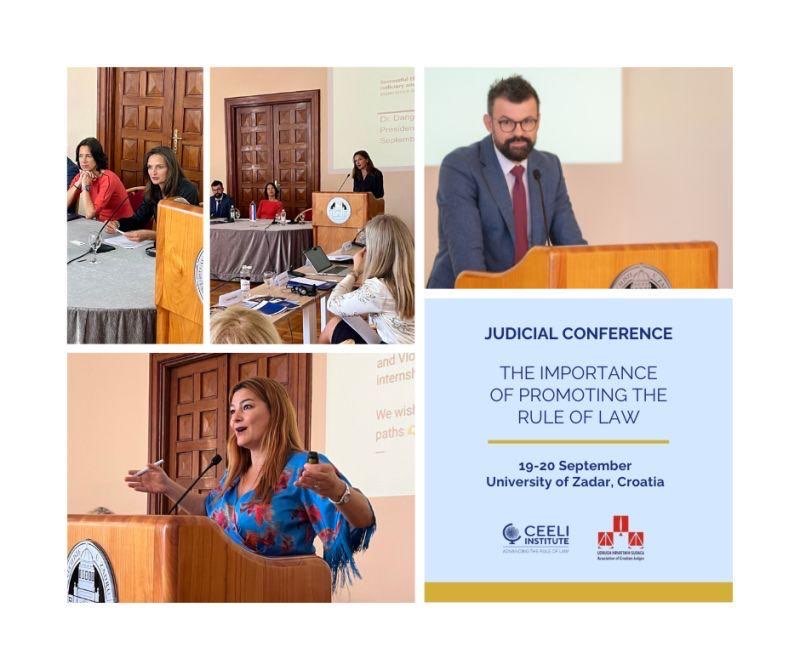
UNODC, May/June 2023, Vienna, Austria
Corruption is a complex phenomenon, cross-cutting different sectors of a society and posing a serious threat to the countries` economic development. The importance of inter-agency collaboration and national and regional alliances of relevant authorities in joining the efforts to prevent and counter corruption is widely acknowledged today. The regional event gathered participants from supreme audit institutions and anti-corruption bodies from eight South Eastern European countries: Albania, Bosnia and Herzegovina, Bulgaria, Croatia, Montenegro, North Macedonia, Romania and Serbia. It was part of a series of training workshops being delivered among the INTOSAI regional group of authorities to leverage the knowledge and experience of the relevant authorities from countries in the Southeast Europe region and foster informed decisions on enhancing collaborations. Ksenija Renko from JUPITER Strategic Consulting, Croatia, provided participants with principles and examples of effective communication for supreme audit institutions and anti-corruption bodies and encouraged participants to share examples and good practices in the open discussion model.

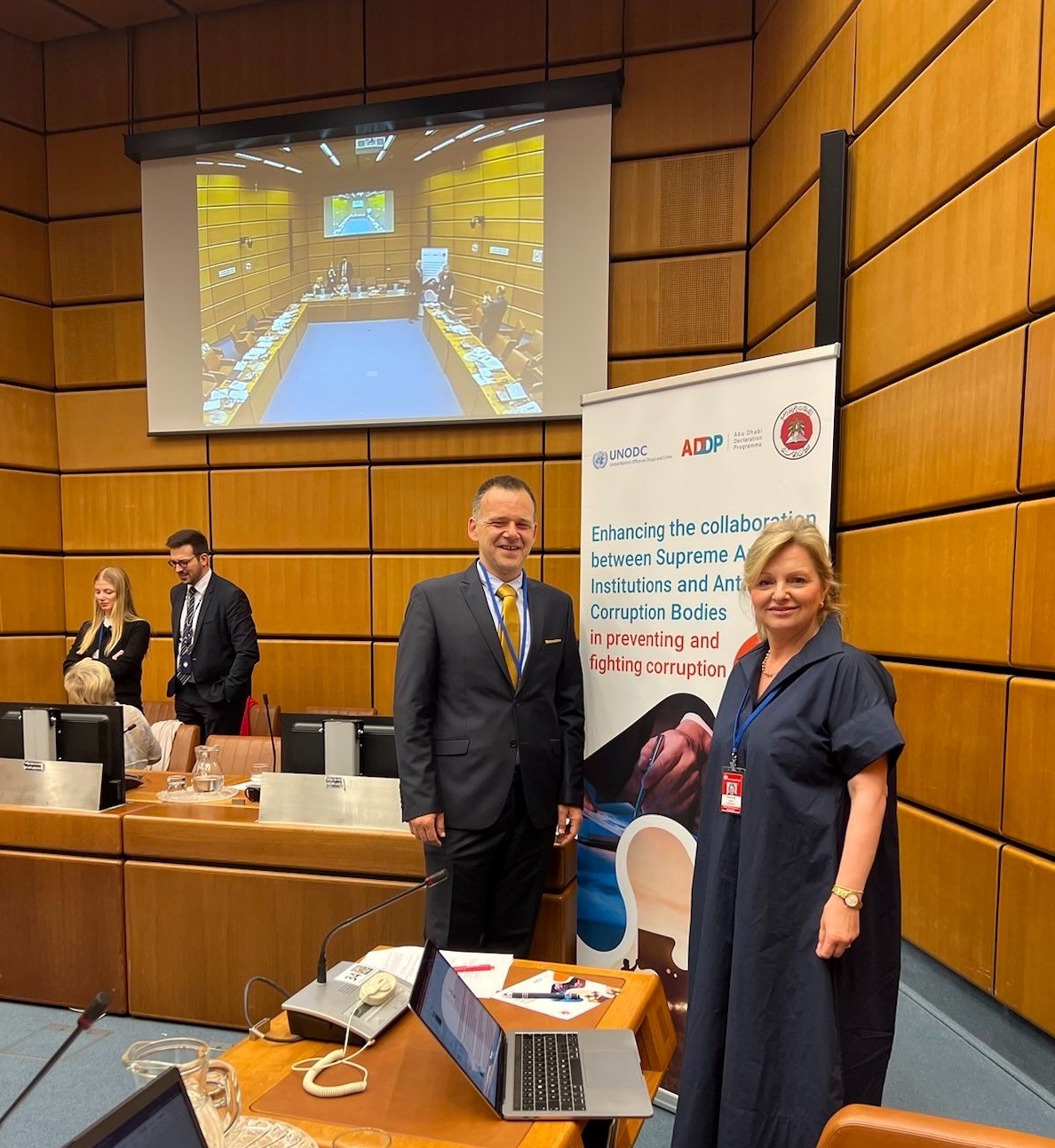
The regional event is designed to follow the Practical Guide on Enhancing Collaboration between Supreme Audit Institutions (SAIs) and Anti-Corruption Bodies (ACBs) that UNODC produced under the Programme and enabled in-depth discussions to identify the areas of cooperation, exchange and joint actions. It also provided a platform for peer-to-peer learning from other countries’ experiences and good practices and for discussions on enhancing the region’s effectiveness and operational cooperation mechanisms. The presence of the experts and lecturers from the EU member countries at the event helped promote the operational collaborative mechanisms and facilitated the accession roadmap for gathered non-EU countries. One of the objectives was to encourage the implementation of the Abu Dhabi Declaration by strengthening the role of SAIs in the prevention and fight against corruption and enhancing collaboration between SAIs and ACBs.
The relevance of cooperation has generated comprehensive efforts at the international level in the past decades to identify the appropriate mechanisms and measures that would help countries and authorities to counter corruption more effectively. Among those, the United Nations Convention against Corruption (UNCAC) is the only universal, legally binding document containing mandatory provisions for State parties. In its Chapter II, UNCAC provides a framework for the prevention of corruption, requiring and recommending State parties to apply a range of measures, from anti-corruption policy, integrity in the public sector, asset disclosures and conflict of interest rules, public procurement, and management of public finances, to the roles of private sector and civil society. Chapter IV is focused on promoting international cooperation, notably amongst law enforcement and other stakeholders.
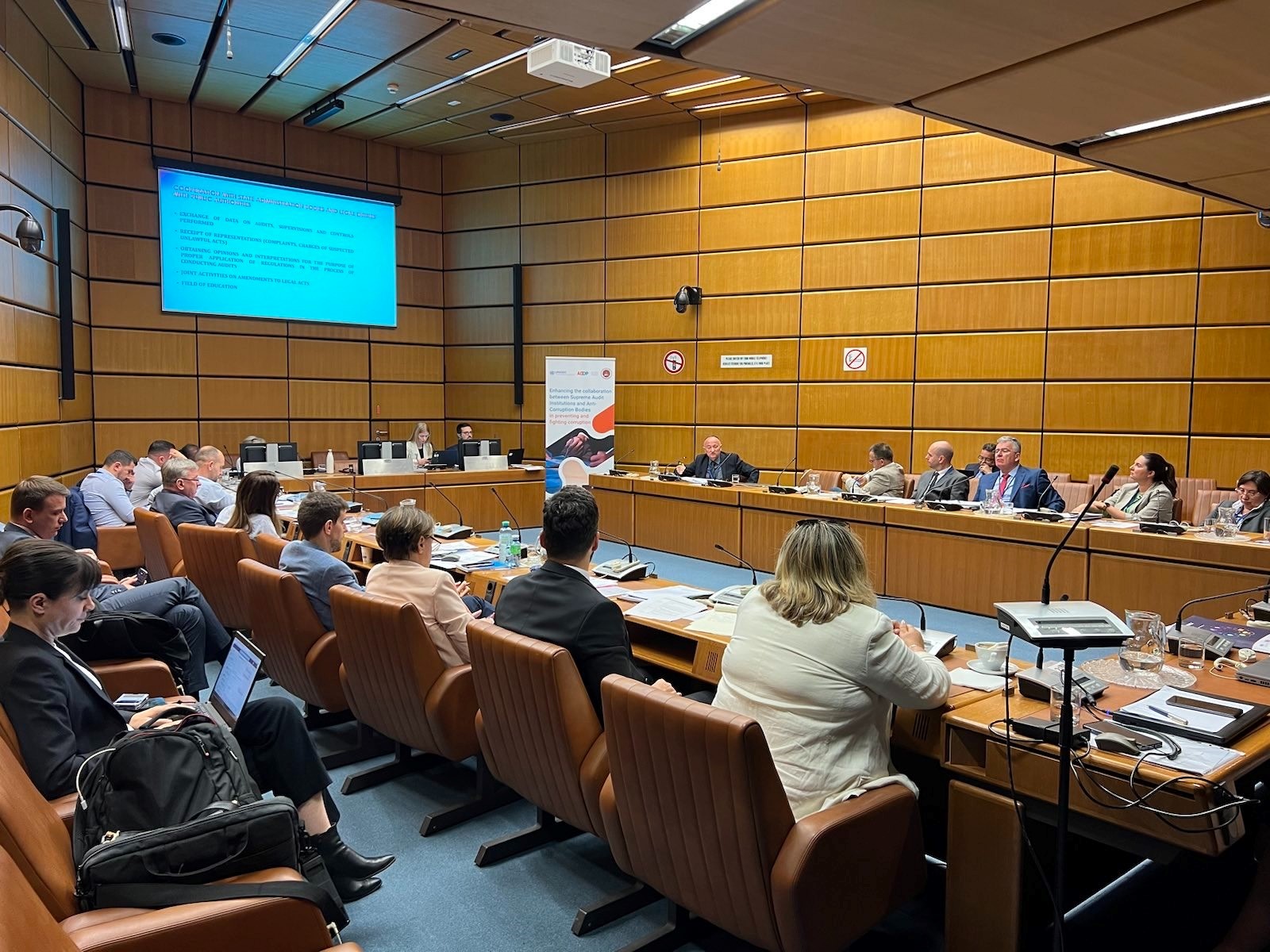
“In performing their noble and demanding mission of fighting corruption in their countries, the supreme audit institutions and the anti-corruption bodies have significantly increased the scope of work and the number of employees. Due to their sensitive and complex work, remarkable public exposure of the organizations, the overall scope of work, and the increased or decreased number of employees – the leaders in the organizations manage their very complex position, which is to mediate between the public, prosecution, politicians, the media, and different experts’ services. Being aware of the above and in compliance with the organizations’ development strategies, the leaders and the managers must decide to undertake the necessary steps and invest their time and resources in upgrading the system and culture of internal and external communication of those organizations, as well as collaborative communication between them. Due to that, it is necessary for SAIs and ACBs communications departments to organize internal communication at horizontal and vertical levels and to ensure the flow of information and data. Strategic external communication with the public and media will allow professionals in organizations to share their opinions and suggestions about their work, working environment, motivation, and above all, to provide a secure and reliable flow of information, which is mainly very delicate and confidential”, stressed Ksenija Renko, Senior Communication Expert from JUPITER Strategic Consulting, Croatia.
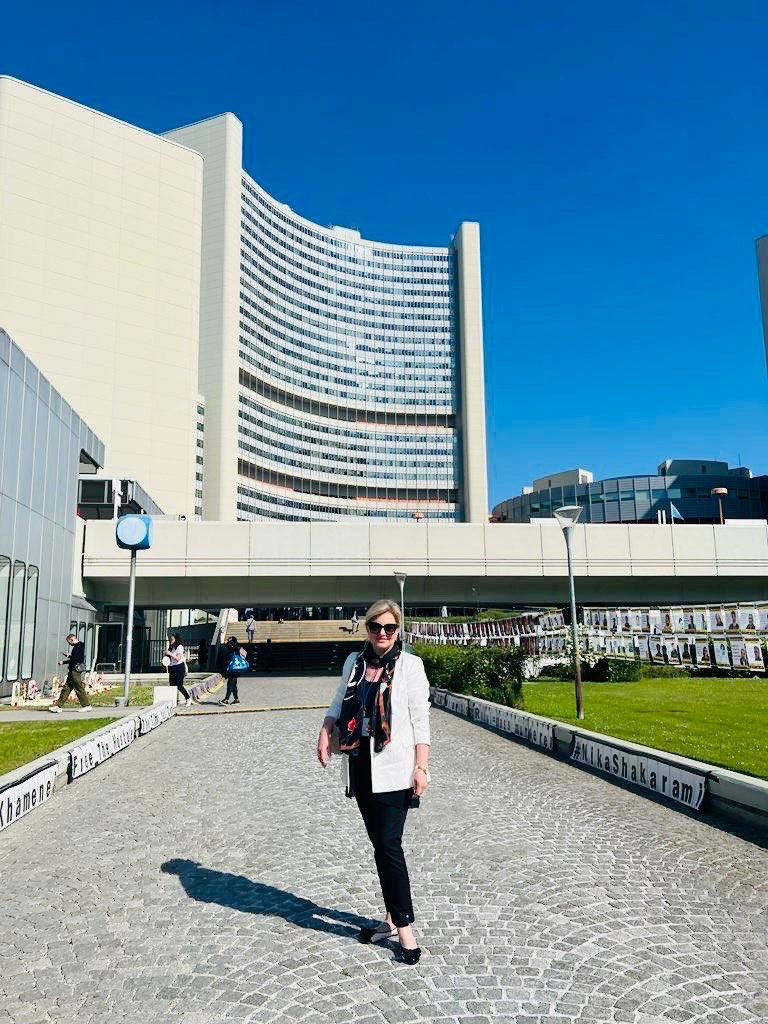
Countries worldwide are increasingly taking efforts to create closer collaborations between their audit and anti-corruption relevant authorities. The recent COVID-19 pandemic has additionally highlighted the need for greater transparency, accountability, and integrity in the use and allocation of public funds, and UNODC has already started providing support to States parties to strengthen their capacity to apply these approaches in practice. In this environment, the need to ensure the integrity of financial management and strengthen the links between auditors and anti-corruption professionals in the state parties has become of paramount importance.
In furthering the UNCAC implementation, the Conference of the States Parties (CoSP) to the United Nations Convention against Corruption adopted the resolution 8/13, entitled “Enhancing collaboration between the supreme audit institutions and anti-corruption bodies to more effectively prevent and fight corruption,” recognizing the importance of the supreme audit institutions (SAIs) and the anti-corruption bodies (ACB) in the fight against corruption. The resolution underlines the critical role of the supreme audit institutions by promoting integrity, accountability, transparency, and the proper management of public affairs and public property and efficient use of public resources to prevent and fight against corruption.
The memorandum of understanding (MoU) between the United Nations (UN) and the International Organization of Supreme Audit Institutions (INTOSAI), signed on 30 July 2019, provides a framework for cooperation between the two institutions in preventing and combating corruption. The overarching areas of cooperation include contributing to the achievement of SDG 16 concerning the performance of governments in the field of effective public financial management and corruption risk mitigation and supporting State parties of UNCAC and Members of INTOSAI in their efforts to implement the Convention effectively.
October 2022, Belgrade, Serbia
On 13 and 14 October 2022, the Conference on Judicial Communication and Journalists’ Safety was held in Belgrade as part of the Strengthening Media Freedom in Serbia, North Macedonia, and Bosnia and Herzegovina project. Together with their partners, the Netherlands Helsinki Institute reflected on different communications models for the judiciary, ensuring the safety of journalists and, above all, ways to bridge the crucial work of the media and the judiciary.
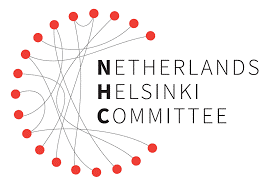

The event was opened by Joost Reintjes, Ambassador of the Netherlands to Serbia, Kirsten Meijer, Executive Director of the Netherlands Helsinki Committee, and Ruth Kronenberg, Executive Director of Free Press Unlimited. The speakers emphasized the crucial position of the judiciary and media and their close cooperation for democracy and accountability.
„If journalists are silenced, a vital pillar of a functioning democracy is crushed. It means that an institution essential to a free society is neutralized. The loss of free, independent media is a loss of democracy “, said Kirsten Meijer, Executive Director at the Netherlands Helsinki Committee.
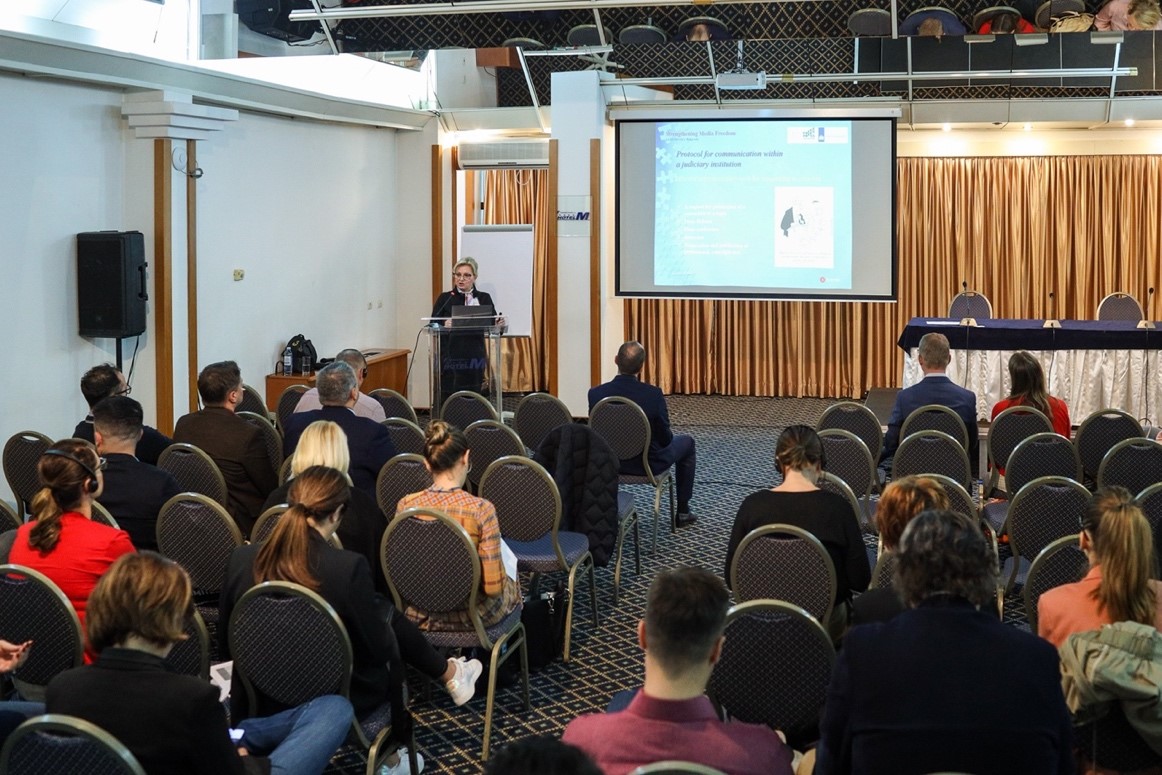
Andrej Bozhinovski, Doctoral Assistant in Criminal Law, University of Zagreb, presented the Macedonian model of cooperation between the media and judiciary and explained what role the Judicial Media Council plays in mediating and maintaining this relationship. Denis Preshova and Tanasija Marinković, professors at the University of Belgrade, presented their research findings concluding that the judicial culture in the region is still predominantly formalist, with the judiciary struggling to act independently, demonstrating a high level of legislative deferral and political obedience.
The plenary session focused on research investigating how Western Balkans journalists perceive the judiciary’s work. The comparative study conducted by Snežana Trpevska, a researcher from the Research Institute on Social Development – RESIS, established that there is still a lot of room for improvement in building trusted relationships between the media and the judiciary. Journalists interviewed for the research noted that the relationship between the two institutions is still dominated by secrecy and fear; the information and documents from courts are difficult to access, while judges and court presidents are rarely available to journalists for additional comments.
Ksenija Renko, Senior Communication Expert from Jupiter Strategic Consulting, Zagreb, Croatia, presented the importance of establishing effective communication with the media for judiciary and courts. She stressed that courts today have a great responsibility to tell their convincing story about what they do and how they do it and to convey the messages of the court to show the citizens that the judiciary, as the third branch of government, plays a vital role in their everyday lives. Only such strategic, planned, and proactive communication can ensure reliable partnership with the media and the well-informed public, a positive perception of the judiciary and citizen’s trust and faith in courts, understanding and credibility of the judiciary, decreasing the number of wrong interpretations and misunderstanding of the judiciary, involvement, commitment, cooperation and the productivity of court employees, and satisfaction of the end users of courts, concluded Ksenija Renko.
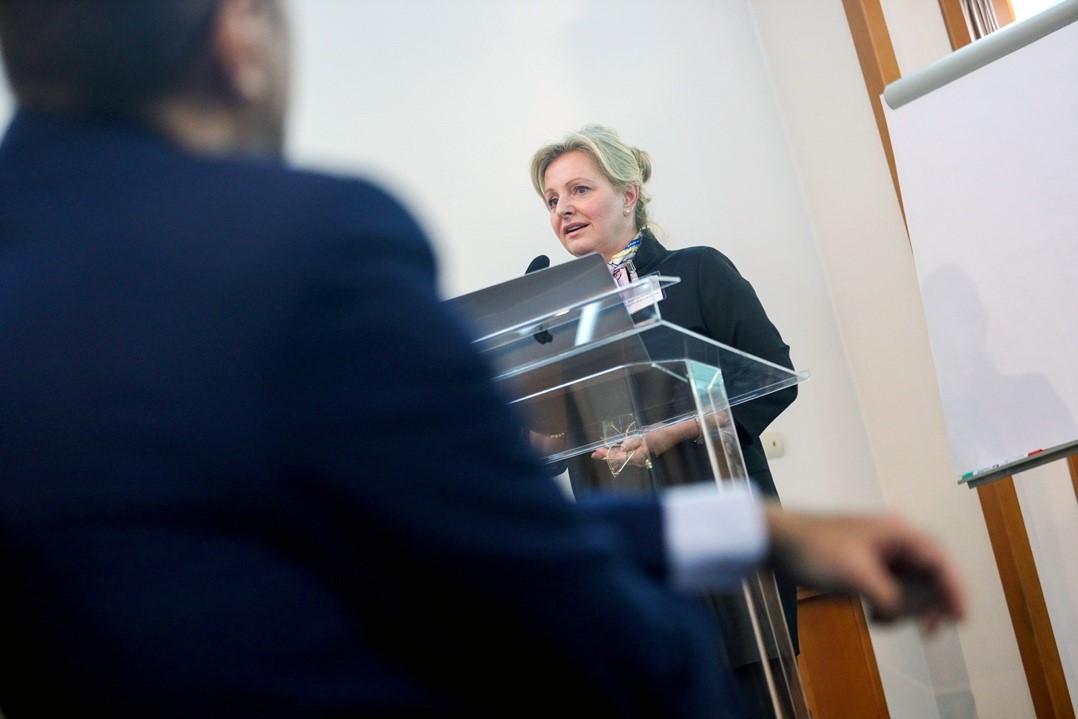
Dragan Sekulovski, executive director of the Association of Journalists of Macedonia, talked about the state of journalist safety in the Western Balkans and established that the impunity for crimes against journalists is one of the main problems alongside the poor implementation of the laws and institutional pressure on journalists. Peter ter Velde talks about the Dutch example of handling harassment and intimidation cases against journalists. He presented a project called PersVeilig (Press Safety) that implemented special protocols in the Netherlands on how journalists, police, and judiciary members should act in case of incidents and crimes against journalists.
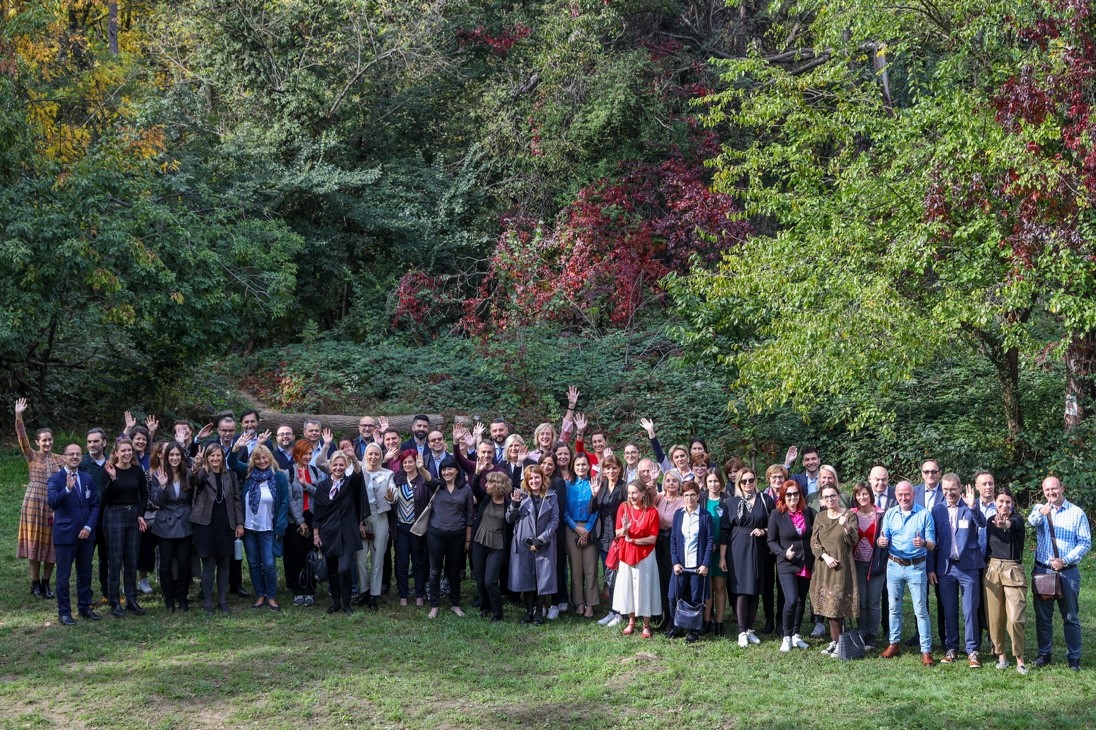
Strengthening Media Freedom in Bosnia and Herzegovina, North Macedonia, and Serbia is a project that combines training, advocacy, and capacity building of the judiciary and media. The importance of the project lies in the complementary nature of the roles played by the judiciary and media, which together ensure the accountability of those in power and enforce the rights of individuals. The main objective is to improve the relationship between the judiciary and the media by creating a platform for exchange between the two professions.
Freedom of the media is the cornerstone of a well-functioning democracy, and journalists are vital watchdogs who ensure governments respond to citizens’ needs responsibly. Unfortunately, the media sector in Bosnia and Herzegovina, North Macedonia, and Serbia is not always able to function safely. Journalists have been harassed, attacked, and killed for doing their job. This project improves the capacity of the judicial sector to respond adequately to the threats journalists face while improving the conditions under which the media operates. Each participating country’s wide variety and diversity calls for country-specific approaches to be recognized. By working with journalist associations, the Judicial Trainings Centers, and civil society, the project aims to be as inclusive as possible to yield satisfactory outcomes for all its stakeholders.
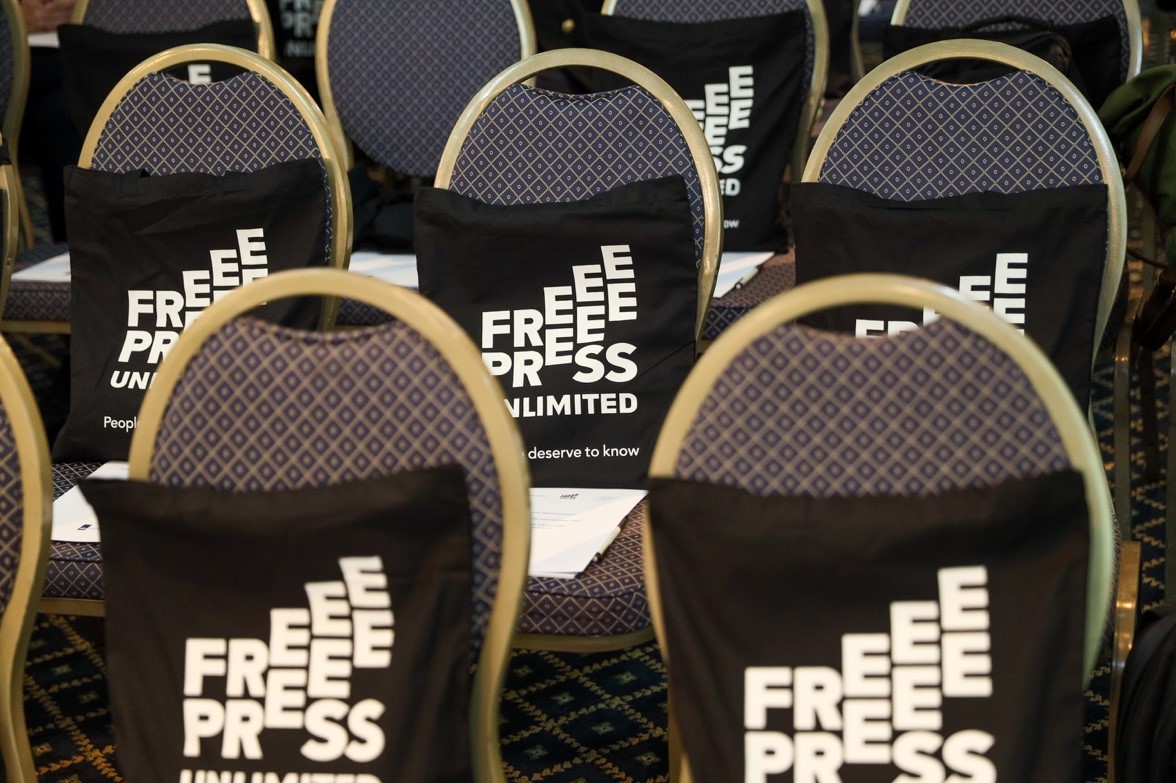
To achieve the project’s aims, the Netherlands Helsinki Committee works together with a number of Dutch institutional experts in this field: Training and Study Centre for the Judiciary (Studiecentrum Rechtspleging), the Prosecution Office (Openbaar Ministerie) and the Netherlands Association of Journalists (Nederlandse Vereniging van Journalisten). The Netherlands Helsinki Committee cooperates on this project with partners from Bosnia and Herzegovina, North Macedonia, and Serbia: The Judicial Training Centers for judges and prosecutors and the Journalist Associations from these countries: BH Novinari, Association of Journalists Macedonia and the Independent Journalists Association of Serbia. For the activities, knowledge, and network related to the Media in the participating countries, the NHC relies on its partner in this project – Free Press Unlimited.
This project is funded by the Dutch Ministry of Foreign Affairs under the umbrella of MaTra projects.
(Photos and text courtesy of the Netherlands Helsinki Committee and Free Press Unlimited.)
May 2022, Sofia, Bulgaria
The Government of Bulgaria and the Basel Institute on Governance have signed a Memorandum of Understanding covering long-term collaboration in the country’s efforts to combat corruption and recover stolen public funds. Through the agreement, the Basel Institute will support the Bulgarian authorities in strengthening the capacity of specialized law enforcement, judicial, and other relevant officers to effectively investigate corruption and related financial crime cases, identify and trace illicit proceeds, and recover them for the benefit of Bulgarian citizens. In addition to training and hands-on technical assistance, ICAR will work with Basel Institute on Governance partners in Bulgaria to review the current anti-corruption chain, illuminate key blockages, and structural deficits, and identify potential solutions.

Kiril Petkov, Prime Minister of Bulgaria, and Gretta Fenner, the Basel Institute’s Managing Director, signed the agreement in the Bulgarian capital Sofia on 18 May 2022, moments after the Council of Ministers approved the agreement. The signing ceremony was also attended by the Minister of Justice Nadezhda Yordanova, who will be a key partner in this program. Prime Minister Kiril Petkov acknowledged that the fight against corruption is a long-term endeavor, commenting: “This partnership is another step in the right direction, and we hope to deliver concrete results together.”
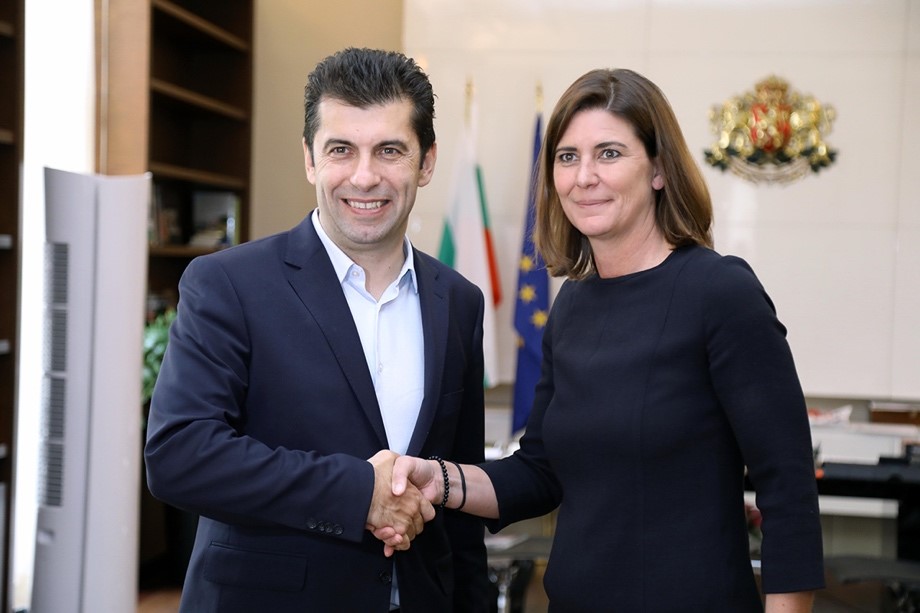
On the same day, the Council of Ministers also approved draft amendments to the Bulgarian Law on judicial Power that aim to strengthen cooperation with the European Public Prosecutor’s Office (EPPO). Emphasizing this is an important piece in the puzzle, Gretta Fenner, the Basel Institute’s Managing Director,said: “We are in this partnership for the long run. The priority is bringing more checks and balances and accountability into key enforcement and judicial authorities. Then we need to ensure that citizens see and feel the impact of these reforms. It will be incremental changes, but we are confident that change is already happening.”
(Photos and text courtesy of Government of Bulgaria and Basel Institute of Governance)
May 2022, Sarajevo, Bosnia and Herzegovina
The role and responsibility of PR practice in the future are to initiate and influence changes and act towards social changes. Education of communication professionals that must be aligned with digital transformation, employer branding, the responsibility of the profession for populism and populism in political communication, cooperation with the media, traditional and new, media ownership, and numerous other topics were the focus of the Regional Public Relations Conference PROACTIVE 2022 held in Jahorina from May 27 to 28, 2022. Innovative topics and presentations by prominent international PR theoreticians and practitioners pushed the boundaries at this year’s PROACTIVE 2022. They set even higher standards in presenting the latest knowledge and experiences from modern practice and theory of public relations. We will try to move them again at the next PROACTIVE conference in May 2023 because education and passing on knowledge and experiences is one of the most critical missions of the PROACTIVE Club – next to selfless professional and collegial support, but also nurturing new and old friendships that have lasted for decades.
Kudos to the PROACTIVE Club members and all colleagues and friends who made it possible: Dobrila Močević, Dragan Močević, Peđa Ašanin Gole, prof. Dr. Dejan Verčić, Miloš Đajić, Drenislav Žekić, Miloš Čirič, Dr. Dragana Đermanović, Vojislav Žanetić, Vladimir Vulić, prof. Dr. Danijela Lalić, Ivan Ćosić, prof. Dr. Ana Tkalac Verčič, Assoc. Dr. Damir Jugo, prof. Dr. Žaneta Trajkoska, prof. Dr. Alenka Jelen, Dr. Nela Kamarčik, Prof. Dr. Asim Mujkić.

https://www.linkedin.com/feed/update/urn:li:activity:6939902491752873984/
Almost 20 years ago, I was honored to be the first program director of the educational conference on public relations PROACTIVE, which gathered distinguished PR practitioners and professional communicators from the entire Region for the first time. That’s why I accepted the duty of being the program director of this oldest and already traditional Regional Conference for Public Relations again with great pleasure. Like the first one, PROACTIVE 2022 gathered the most respected communication and business experts from Southeastern Europe countries: Slovenia, Croatia, Serbia, Bosnia and Herzegovina, Montenegro, and North Macedonia for three days. During excellent presentations and interesting discussions, we analyzed the problems and the impact of dramatic changes in the communication industry and tried to define new communication paradigms of strategic communication.
We are aware that we live in a divided world of unrest, poverty and repression, danger and division, hatred and war, and a world of hope and discovery, endless opportunities and possibilities. We are aware that in the circumstances of the COVID-19 pandemic and war, states, institutions, corporations, and brands find it increasingly difficult to preserve their reputation and quality communication.

The intensity of the crises we face today exceeds all previous experiences of PR practitioners. As Emerson wrote long ago: “This time, like all times, is a very good one, if we but know what to do with it.” Therefore, raising ethical and professional standards for PR professionals is a more significant challenge today than ever. This challenge requires us to carry ethics into our daily lives and use its invaluable influence to gain the trust and respect of our clients in the face of entirely new and different challenges. This challenge requires us to convey the principle of good and fair competition through our business and the determination and courage that build the core of success. We must be aware of our essential social role – be a certain social corrective that certainly impacts society. As caring teachers and mentors, we, PR veterans, must selflessly exchange and share our knowledge and experience with our colleagues, especially the younger ones. And the process is often reversible, so the freshness and creativity of young minds, their new knowledge, and youthful enthusiasm are contagiously transferred to the mentor and strengthened and refined him.

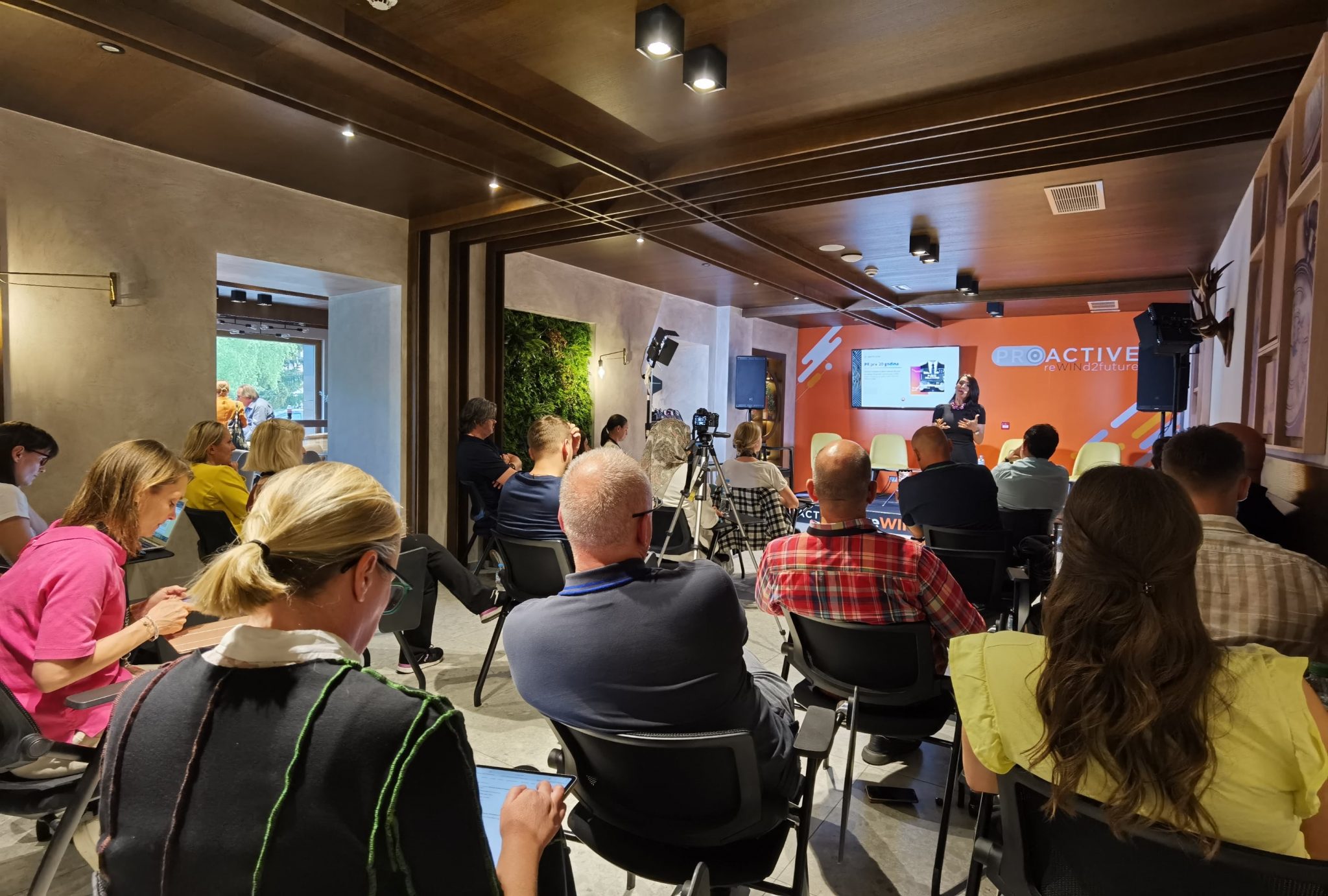



Conference participants from the entire region discussed the most current topics for the communication profession and the whole society. They concluded that public relations must improve their reputation and regain the authority to deal with their obligations successfully, recognize social problems, and initiate processes of social change for the better. Data show we have seven PR professionals to one person in traditional media today. Cooperation with traditional media must be improved to benefit everyone and include new media forms and people, such as influencers. We must win the media back as partners, especially in the context of public advocacy.
The economy of attention in the time of hyperproduction of content insists that more than ever, we deal with what is essential for our organizations and us as individuals to make our content more visible, understandable, and of better quality, but above all, more meaningful and everything we do more purposeful. PR professionals must use Fact-checking as a tool and advocate for its introduction into the education system through media, digital and scientific literacy subjects. Alternatives that oppose the current government are worse because they are based on populism and demagoguery, and one of the problems is that most politicians are “analog.” Conversely, we have new “digital” generations of voters. PR has become part of the problem, as said at the panel discussion of regional experts on politicism in political communication.

“It is equally important to do things good or to do good things. That is why the oldest regional educational conference, PROACTIVE, continues bringing distinguished communication experts from the entire region. It is our responsibility to restore the reputation of the profession we work and love”, said members of the PROACTIVE Club.
“We live in a post-literary society with no authorities, and the influence of science is decreasing. “Hyper-globalization, hyper-complexity, hyper-modernity, hyper-narcissism, hyper-democracy, hyper-consumption has created a hyper-everything society in which everyone searches for all their knowledge on the Internet,” said Prof. Dr. Dejan Verčić, Faculty of Social Sciences of the University of Ljubljana / Herman & Partners, Slovenia.
“Our politics is sloppy, and the social reality rests on consumerism, populism, hyperglobalism, and other isms,” said Prof. Dr. Voja Žanetić, Faculty of Media and Communications, Belgrade, Serbia, in his lecture “Politics is communication and what else?”
“PR professionals must assume their role and responsibility in employer branding because it rests on high-quality internal communication,” said prof. Dr. Ana Tkalec Verčić, Faculty of Economics, University of Zagreb, Croatia, through her lecture “Internal communication and employer branding: we know everything, but we know nothing.”
“In the future, most jobs will be done faster, better, and easier by robots, but the jobs that require creativity and critical thinking are the ones that robots will never be able to replace,” said Dr. Dragana Đermanović, Pepper Consulting Group, Novi Sad, Serbia in her lecture “From PR to comprehensive corporate development. “
“The intensity of the crises we are facing today exceeds all previous experiences of PR practitioners. In the new circumstances, states, institutions, corporations, and brands find preserving reputation and quality communication increasingly difficult. The mission of raising ethical and professional standards is more important than ever, ” stated Ksenija Renko, Jupiter Strategic Consulting, Zagreb, Croatia.
November 2021, Tirana, Albania
The domestic law gives only limited advice to Vetting Bodies in Albania on how to work with media if it comes to conflict between the right of the media on information, the right for privacy of the vetted magistrates and the smooth flow of the vetting procedures. Organized in co-operation with Special Appeals Chamber (AC), Independent Qualification Commission (IQC) and Public Commissioner’s Office (PC) and Co-organized and co-funded by the Technical Assistance and Information Exchange Instrument (TAIEX) of the European Commission, the workshop “Judicial Communication for the Vetting Bodies in Albania” was designed to give guidance in the field of ethical and legal matters related to communications with media, the importance of strategic media communication and practical advice from communications experts and experienced spokesperson.


The main objective of the workshop “Judicial Communication for the Vetting Bodies in Albania” was to provide the beneficiaries with practical advice and guidance on the principles of judicial communication, media engagement and their application in the activities of the re-evaluation of institutions, with the aim of improving their communication with the press and thereby contributing to a better understanding of the vetting process. The workshop was focused on crisis communication, regular communication and access to information requests.Some examples of the jurisprudence of the European Court for Human Rights and other national courts were introduced to the participants as well as number of international instruments that give good guidance, in particular the Opinion no 8 (2013) of the Consultative Council of European Prosecutors on Relations between Prosecutors and the Media. The workshop culminated in a practical exercise, in which the participants could apply their newly acquired skills to a study case and receive advisory comments from the experts.

The important topics were presented by the international experts Ms Anette Milk, Senior Prosecutor and Media Spokesperson at District Prosecution Office Essen from Germany, MsKsenija Renko, Senior Communication Expert and Director of JUPITER Strategic Consulting Ltd. from Croatia and Mr Nicola Piacente, Chief Prosecutor at the Prosecution Office Como from Italy. The experts stressed the advantages but also necessity of foresighted, transparent and strategic relations with the media and offered means to do so. By applying good practice and strategically designed communication, the judicial bodies in the Vetting process in Albania will be able to achieve a reliable partnership with the media and the well-informed public, a positive perception of the judiciary and citizen’s trust and faith in judicial bodies. Consistent communication of judicial bodies with the external public will insure increase of understanding and credibility of the judiciary, decreasing the number of wrong interpretations and misunderstanding and satisfaction of the end users – the public.
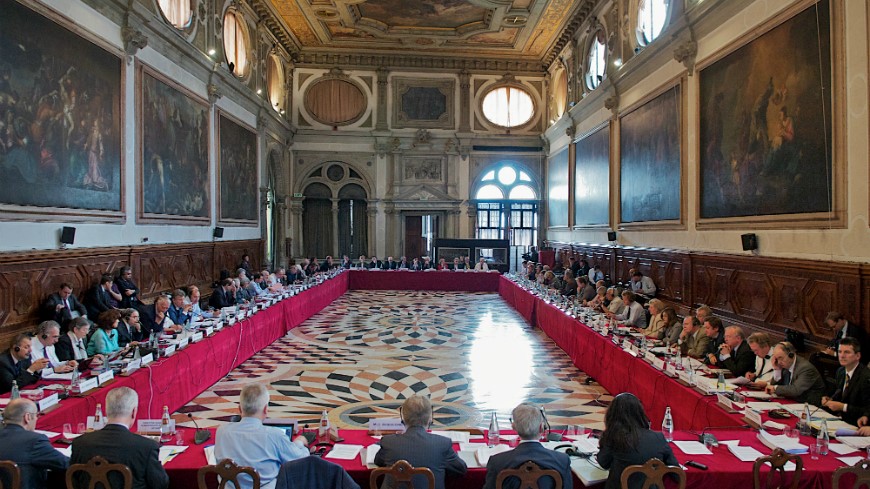
From: Exit Staff 01-12-2021 at 16:23
In December 2021, the Venice Commission has presented the Parliament of Albania with a draft opinion that suggests constitutional amendments to extend the expiring mandate of judicial vetting bodies should be approved. As part of Albania’s far-reaching justice reform, two commissions have been tasked with vetting all judges and prosecutors. According to the constitution, their mandates expire in June 2022, but only half of the country’s magistrates have gone through the process. The Socialist majority in Parliament requests that their mandates be extended for another two years, with the support of the International Monitoring Operations (ONM), the EU and US.”
Read more: Extending the Mandate of Vetting Bodies: The Options on the Table
October 2021, CEELI Institute Prague, Czech Republic
An increasingly important aspect of the CEELI Institute’s continuing engagement with judiciaries across the region involves exploration of the relationships between the judiciary and the media. Discussions and materials addressing this topic are in high demand among judges who are faced with increasing media pressure, especially while handling politically sensitive cases and high-level corruption cases. Judges must also increasingly discuss the potential pitfalls surrounding the use of social media platforms. Judges are concerned about their rights to privacy in an age of increasing media attention, and are also unclear on where the boundaries should be set in dealing with the press. They are also challenged in balancing the public’s interest against the rights of the parties before the court. The CEELI Institute has been honored to work with an increasingly diverse cadre of experts in this field to explore these critical issues. We also work to foster communication skills of courts and judges in dealing with the public, and in responding to outside scrutiny. These issues are increasingly incorporated into many of the judicial programs now organized by the Institute.

As part of our ongoing work with the Central & Eastern European Judicial Exchange Network, the CEELI Institute organized a two-day workshop to strengthen dialogue and communication skills for judges and court spokespersons at the end of October. The training entitled “Strengthening Communication Skills for Judges in Dealing with the Media and the Public,” gathered judges, spokespersons, academics, and communication and rule of law experts from across Central and Eastern Europe and specifically from Albania, Croatia, Bosnia and Herzegovina, Georgia, Lithuania, Poland, Serbia and Slovenia. The tailored workshop provided the participants with knowledge on how to give effective media statements and to make the most out of media appearances, as well as identifying best practices in managing communications during a crisis. The faculty shared regional case studies from Croatia, North Macedonia, Serbia and Slovenia and many participants shared experiences from their own countries’ judiciaries.
Kudos to the fellow faculty members for making this possible:
Dr Freda Grealy, Ksenija Renko, judge Radmila Dičić Dragičević, judge Branko Hrvatin, judge Davor Dubravica, Andrej Božinovski, David Sellers, judge Paul Byron, judge Bernard McCluskey, judge Gabriela Gajdova, judge Gjorgji Andonov, Ioanna Lachana.
by Adrien MASSON
The innovative work at CEELI Institute has the capacity to lay the foundation for ground-breaking policy actions across the jurisprudences in Central and Eastern Europe. As a proud Faculty for this workshop on “Strengthening Communication Skills for Judges in Dealing with the Media and the Public” we discussed the approaches in choosing the best way to convey the message to the public and keep the balance between the respect of the presumption of innocence and keeping the public informed. We were pleased to see participants demonstrating a firm commitment to improving communication with the public and the media.
As expected, the approaches differ quite a bit, but it’s encouraging to see judges and spokespersons bringing new attention to choosing appropriate ways for communication, harmonization, and dialogue with the media and the public. The wind is blowing strongly in the direction of a new strategic communications model, suggesting giving life to Opinions 7,8,12 and 24 of the Consultative Council of European Judges in forming specialized bodies for easing of communication between judges and journalists. Judicial transparency and easy communication can be the new, achievable frontier for multilateralism.
December 2019 CEELI Institute Prague, Czech Republic
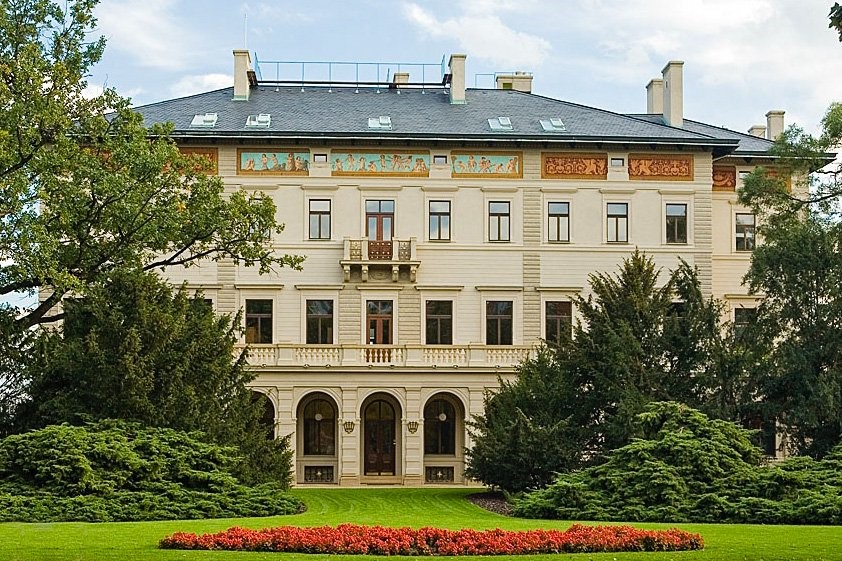
Over the past year, the CEELI Institute has produced and published a number of substantive tools, guidelines, and monographs on topics of current relevance to judges, lawyers and human rights defenders across Europe and beyond. Among them, CEELI is delighted to introduce the most recent publication, Practical Guidelines on Use of Social Media by Judges: Central and Eastern European Context. The Guidelines recognize that participation on social media platforms is an intrinsic part of modern life; they also recognize that for many judges, participation on social media actually contributes to their public outreach efforts and their effort to build public interest in and trust of the judiciary.
Since there have been very little specific guidance and very few standards to date regarding these issues, judges often have to come up with their own individual solutions or approaches, which might lead them into situations involving conflicts of interests and ethical dilemmas. The new Guidelines represent several years of work by judges from CEELI’s Network of Central and Eastern European Judges, and summarize research and discussions that Network members have undertaken over the past several years. The goal of the document is to provide judges with a clear overview of the pros and cons of using social media and offer recommendations on how to use it smartly and safely. The document is relevant to any individual judge who is active on social media as well as to anyone responsible for setting national guidelines for judicial conduct. This includes members of judicial councils, court presidents, officials from judicial associations and any other members of the judiciary who need to set regulations on the behaviour of judges on social media. This publication is a testament to the extraordinary commitment of time and effort by the Network judges who participated in this project and who undertook extensive independent research and editing, coming together periodically at the Institute to coordinate and collaborate on their work.
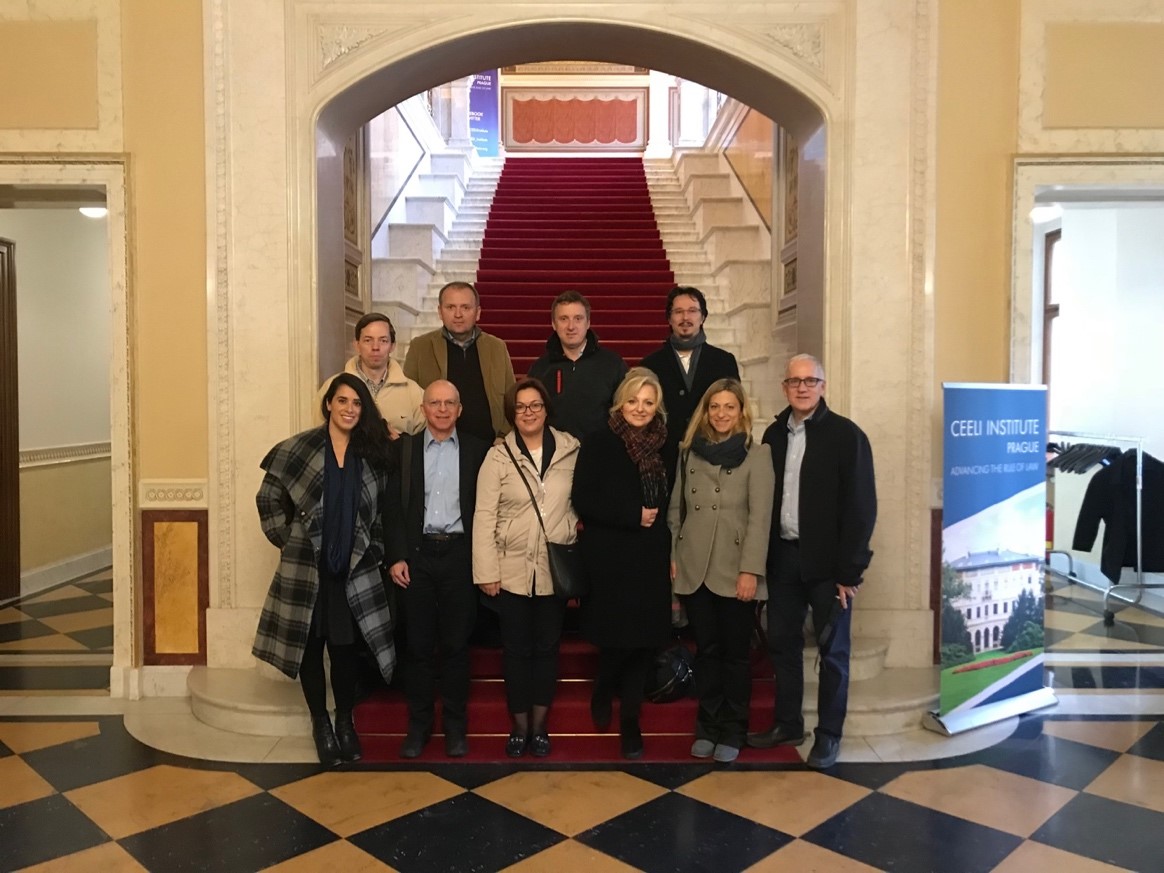
Thanks also to Ksenija Renko,Jupiter Strategic Consultant Ltd. and Marko Rakar, Mrak Ltd, regional public relations and communication experts, to David Sellers, Public Affairs Officer, Administrative office of the US Courts, Barbora Field and Freda Grealy, CEELI Institute Program Managers, and Katherine Sorrell, CEELI Institute Legal Intern (William and Mary Law School) for their valuable contributions in developing these Guidelines. The Institute also wishes to thank the Hon. Judith Macaluso, Janet Katz, and Jane Mahoney for their invaluable assistance in editing this document.
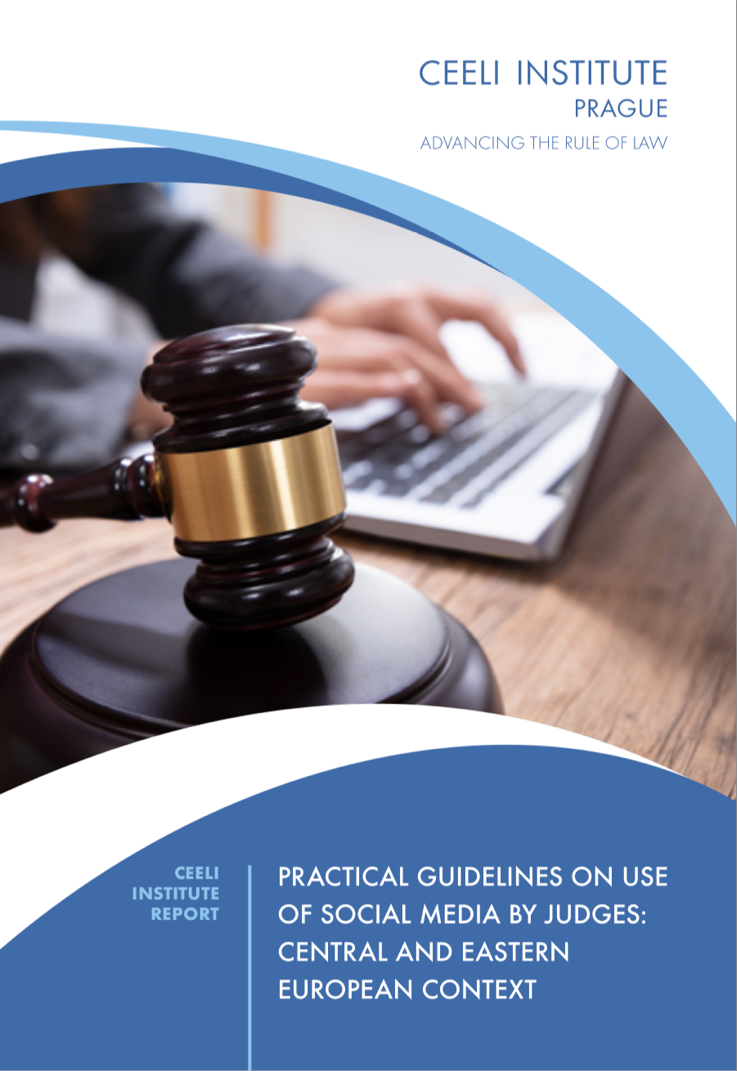
OVERVIEW OF RECOMMENDATIONS
1. Represent the Judiciary Well in ALL Social Media Content
Always maintain a professional tone and maintain an awareness of your role as a judge even if posting in a personal context. Anyone with a career in the judiciary needs to be careful about what they write and what they publish online, whether via email, text, or social media posts, since digital content is so easily and widely accessible and could impact their work in a variety of ways.
2. Never Comment on Pending Cases
In line with the Bangalore Principles comments about court judgments or ongoing cases are particularly sensitive, because they can raise suspicions about the impartiality and objectivity of judges and the judicial system.
3. Do Not Use Social Media to Investigate Parties
Judges must consider only the evidence presented by the parties and any facts properly subject to judicial notice. Judges should not independently investigate case facts by means other than those provided by law.
4. Mind Whom You “Friend” and What or Whom You “Like”
When declaring yourself a friend with someone on social media or liking particular posts, members of the judiciary should take care not to compromise their neutrality. Interaction on social media can create the perception of bias, even if it does not exist.
5. Avoid Political and Commercial Comments
Judges should stay out of political debates and not publicly disclose their political views.
6. Adjust and Monitor Your Online Visibility
Carry out regular review of your online social presence and adjust your privacy settings if necessary.
7. Protect Your Personal Data
Think twice before revealing any personal information. Once you post personal information on Facebook or any other social network, it is highly unlikely that you will be able to keep it private. Such personal data has a permanent presence and can be recovered, circulated, or printed years after being sent or posted online.
8. Educate Your Family and Friends
Talk to your family and friends to ensure they understand the sensitivity of the judicial work you conduct and potential consequences of their actions online if they reveal personal information or photographs that could be linked to your profile.
9. Using Social Media to Educate the Public
Social media platforms can be used as a positive tool to engage and educate the public, promote transparency, advocate, explain the importance of judicial tasks, and provide information about the activities of judicial institutions. Many judges throughout Central and Eastern Europe, and beyond, have successfully used social media to this end.
10. Continue to Educate Yourself about Social Media
Social media is here to stay and judicial training and continuing education on social media use is critical. Among other things, judges must be familiar with the operation of social media as issues related to its use will increasingly be relevant to the cases before them.
November, 2019, Belgrade, Serbia
High-Level International Anti-Corruption Conference “Fight against Corruption for Prosperity in South-East Europe” was held from 3-5 November 2019 in Belgrade organized by the Ministry of Justice and the EU funded project Prevention and Fight against Corruption.
The conference aimed to highlight and promote the complementarity efforts of the international and national anti-corruption and integrity mechanisms and authorities, including the results of the specialized law enforcement institutions in fight against corruption in Serbia, region and beyond. More than 200 delegates from 14 countries attended the conference. The opening ceremony was addressed by Serbian Minister of Justice Nela Kuburović and Head of the EU Delegation to Serbia, Ambassador Sem Fabrizi. The Minister of Justice stressed that the Government of Serbia demonstrates a clear political will and unambiguous commitment to a strategic approach to the fight against corruption. Aware of the far-reaching consequences that corruption has on the rule of law, social equality and economic development, Serbia began a systematic fight against corruption in 2012. Kuburović stressed that Serbia has more than ever strengthened and rounded off its repressive mechanism in this area by adopting the Law on Organization and Jurisdiction of State Authorities in Combating Organized Crime, Terrorism and Corruption, as well as reforming the Criminal Code by introducing seven new anti-corruption crime measures while others are improved.
The Minister of Justice emphasized that Serbia paid equal attention to preventive action. In May this year a new Law on Prevention of Corruption was adopted, in November last year the Law on Lobbying was adopted while from 2015 Serbia became a pioneer in protection of whistleblowers by adopting the Law on protection of whistleblowers. In the 18 months since the enforcement of the Law on Organization and Jurisdiction of State Bodies in the Suppression of Organized Crime, Terrorism and Corruption began, 749 persons have been convicted of corruption offenses. During that period, special departments of the higher public prosecutor’s offices acted on criminal charges filed against 15,222 persons, of which 1,269 persons were indicted and 771 verdicts were rendered, of which 749 were convicted.
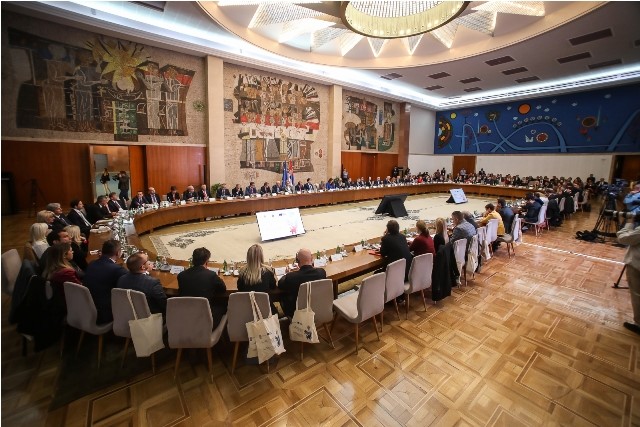
The Head of the EU Delegation to Serbia, Sem Fabrizi said that Serbia is on its way to the EU and that as such it is fighting corruption, that several important laws have been adopted to this end, and that there is now an emphasis on the implementation of those laws. Fabrizi stressed that it is very important that laws do not remain a dead letter and that, if the laws are enforced, the confidence of citizens, companies and the international community will be greater. EU countries are a positive example in this area, as the Corruption Perceptions Index, measured by Transparency International, is among the top 20 in the EU’s 14-member states and wants to share its experiences in the region.
“Serbia has taken a number of crucial steps in the past period, which helped build a framework of legislation and institutions that can help deter corruption and related phenomena. There is important work that is being carried out by the newly established special specialized authorities to investigate, prosecute and adjudicate corruption and organized crime in line with the law”, Ambassador Fabrizi says. The EU expects Serbia to actively apply these legal solutions, which is why we will monitor the results presented through the data together with the public, says Ambassador Fabrizi.
“We have a long road ahead in the European Union and in Serbia and in the countries of the region. I assure you that we will continue to work together. I thank all those involved in the implementation of projects, and especially the fighters against corruption, who are facing this phenomenon on a daily basis,” concludes the Head of the EU Delegation.
The ministers of justices, prosecutors, heads of state bodies for the prevention and fight against corruption, as well as representatives of the civil sector from Serbia, Albania, Austria, Bosnia and Hercegovina, Croatia, Czech Republic, Hungary, Italy, Montenegro, Northern Macedonia, Romania, Slovakia, Slovenia and Turkey discussed the improvement and strengthening of cooperation between the relevant anti-corruption institutions and services. Within the conference, a ministerial segment was led by Minister Kuburović, addressing participating ministers of justice, as well as four panels on new investigative mechanisms and international cooperation in prosecuting corruption cases, the role of state authorities in preventing corruption, the role of civil society in preventing corruption and usage of modern technologies in the fight against corruption.
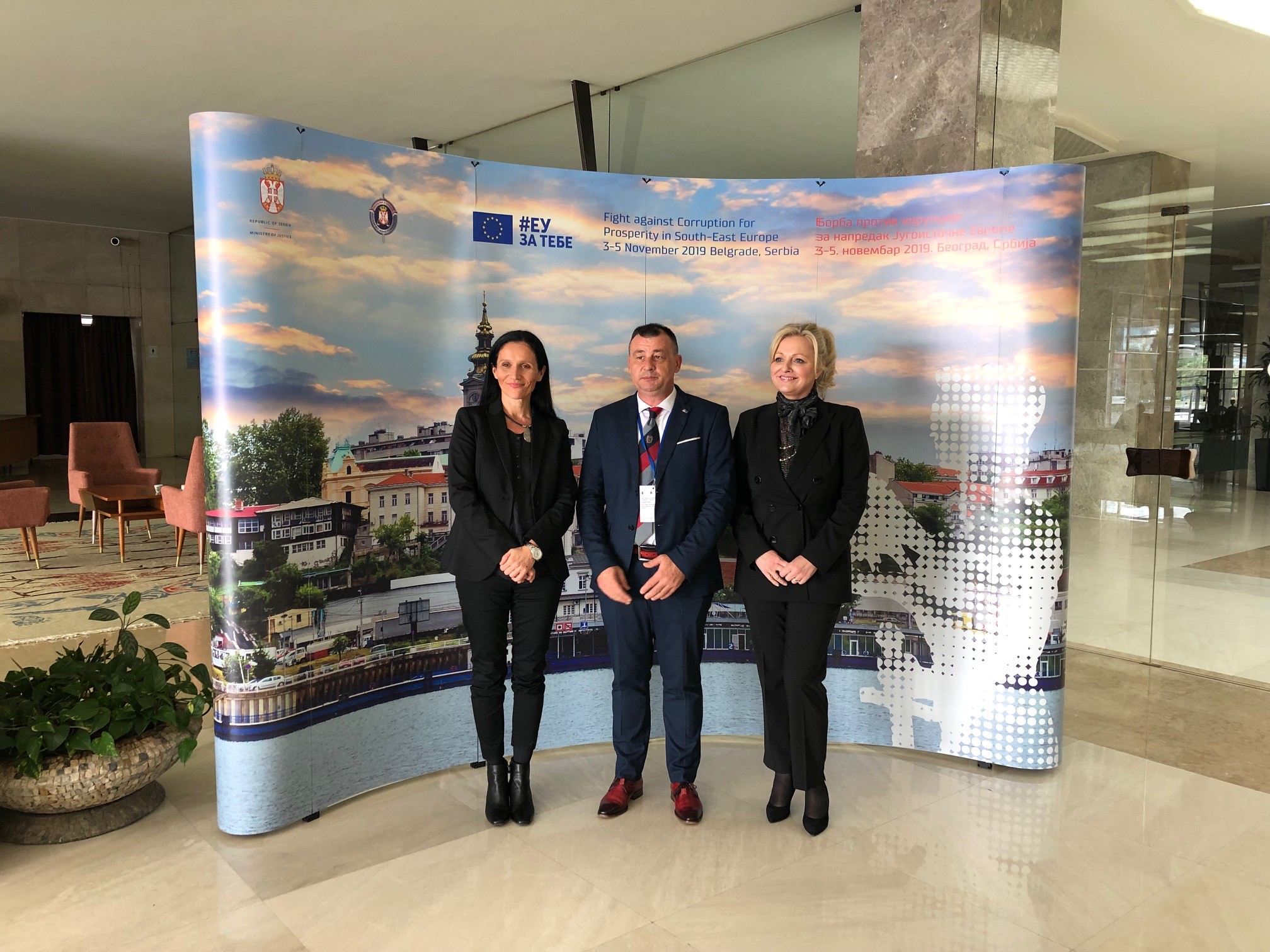
The conclusions of the international conference conducted by senior experts Roman Prah from Slovenia, Ksenija Renko from Croatia and Veliborka Staletović from Serbia, emphasized that effective fight against corruption requires:
• Effective cooperation and synergy of all national and international bodies;
• Improving the capacity of all bodies in the prevention and fight against corruption;
• Ensuring minimum standards in the field of corruption prevention – promoting institutional governance and the exchange of information and good practice between national and anti-corruption bodies;
• Improving the efficiency of public administration, increasing transparency, accountability, integrity in governance and decision-making in public policy-making – which will further mitigate the risks associated with corruption;
• The civil sector has a very important role to play in the fight against corruption, which has been recognized in all participating countries;
• Civil society organizations, in addition to raising awareness of the importance of preventing and combating corruption, must constantly monitor the functioning of government bodies and institutions;
• With an independent and strong judiciary and good laws, preventing corruption requires use of modern technologies, which will strengthen the internal capacities of public authorities in the digital age;
• Such modern anti-corruption policies make it possible to effectively measure corruption and assess its impact on economic development and the rule of law, and links between corruption and organized crime;
• Continuous trainings and exchange of information of all relevant actors in the prevention and fight against corruption.
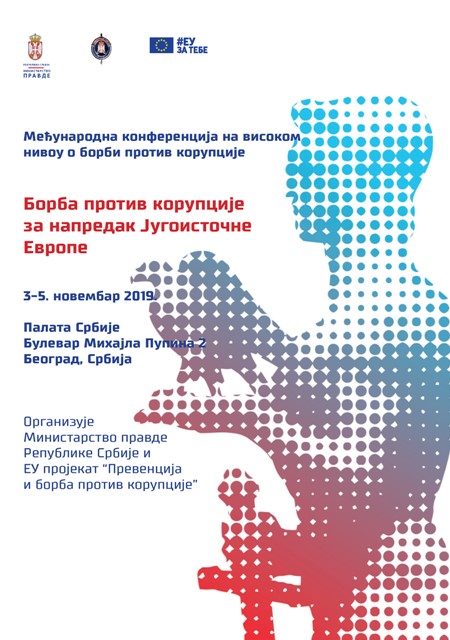
July 2019, Tbilisi, Georgia
The Forum aimed at raising awareness on freedom of expression and judicial ethics and discussing the balance between freedom of expression of judges and modern challenges. The event was focused on general legal framework and country – specific experience; best practices shared by international experts, main challenges of Social Media and Judicial ethics, and recommendations on the developing social media guidelines for judges.

The Forum was opened by Independent Inspector KetevanTsintsadze, Acting Chief Justice Mzia Todua, Secretary of the High Council of Justice Giorgi Mikautadze, the Head of the Council of Europe Office in Georgia Cristian Urse, the Head of EU4Justice project Renate Winter, and the Head of the USAID/PROLoG Giorgi Chkheidze.
The topics were presented by international judges and experts with significant expertise in this fields. On the panel on Social Media and judicial ethics and specific recommendations on how to use Social Media for judges were included Mjriana Visnetin, Council of Europe Expert, Judge Duro Mateus Cardoso, EU4Justice, Judiciary Support Project, James E. Moliterno, Vincent Bradford Professor of Law – USAID/PROLoG, Judge Ketevan Meskhishvili, Tbilisi Court of Appeals, Judge Ladislav Derka who is an author of the Czech Guidelines on the use of social media by judges and communication expert Ksenija Renko, Jupiter Strategic Consulting, Croatia, who is cooperating with the CEELI Institute on developing of “Practical Guidelines on Use of Social Media by Judges: Central and Eastern Europian Context”.
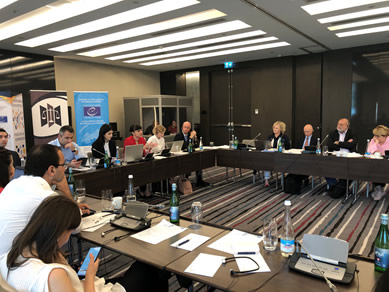
Mrs. Ksenija Renko, Jupiter Strategic Consulting, presented recommendations with examples of social media misconduct that can compromise the independence, integrity and impartiality of a judge, undermine public confidence in the judiciary, and lead to disciplinary action against a judge. She explained that the CEELI Practical Guidelines will summarize these considerations and provide judges with clear overview on the pros and cons of social media use, and offer recommendations on how to use it safely. This document will be relevant to individual judges who are active on social media and also to those responsible for setting national guidelines for judicial conduct, including members of judicial council, court presidents, officials from judicial associations, and any other members of judiciary who need to set regulations on the behaviour of judges using social media.


Ksenija Renko
Chief Executive Officer & Strategic Communications Consultant
JUPITER Strategic Consulting Ltd.
Ksenija Renko is a seasoned communications expert with over 25 years of experience, recognized for her expertise and extensive contributions to strategic communications and communication management. Her work has been pivotal in shaping and executing strategic communication efforts for high-profile donor-funded initiatives and European Union projects, particularly those tied to the EU accession processes and justice sector reforms in Croatia, Serbia, Bosnia, and Herzegovina, Turkey, Albania, and Kosovo. Her leadership in developing and implementing communication strategies for anti-corruption campaigns across Central and Eastern Europe underscores her expertise in managing complex, multifaceted communication endeavors.
With a robust portfolio of achievements, Ksenija has helped design and implement numerous communication and visibility policies and strategies, as well as online communication and social media campaigns in Croatia and Southeast Europe. She has also provided expert services in reputation management and crisis management, encompassing problem identification, on-site crisis support, and client guidance through restructuring, mergers, acquisitions, and stakeholder relations mediation.
As a trainer with over 15 years of experience, she has delivered comprehensive training programs for public officials across Albania, Bulgaria, Bosnia and Herzegovina, Croatia, Georgia, Kosovo, North Macedonia, Serbia, and Turkey. Notably, she has expanded her reach globally, conducting Public Outreach and Communication training for public officials of the African Judicial Exchange Network, representing Gambia, Ghana, Kenya, Nigeria, Tanzania, and Uganda. Her training expertise encompasses diverse topics, including strategic communications, crisis management, internal and external communications, and effective use of social media.
Ksenija’s professional leadership extends to her founding role as the Managing Director of Publicis Consultants Zagreb, Adriatic Hub, under the esteemed Publicis Groupe. Currently, she leads Jupiter Strategic Consulting Ltd., an agency specializing in strategic communications and communication management.
As an active participant in global networks, Ksenija Renko has played a key role in creating innovative resources, including the Practical Guidelines on the Use of Social Media by Judges. This pioneering document, specifically designed for the Central and Eastern European context, was published by the CEELI Institute in Prague.
Ksenija Renko has been a lecturer at the University of Dubrovnik, teaching PR Campaign Management and Integrated Marketing Communications courses.
Ksenija has held several key positions within professional associations, including President, Vice President, and board member of the Croatian Public Relations Association. Her dedication to advancing the public relations profession has earned her lifetime honorary membership in the prestigious CEE association PrOACTIVE CLUB PROven in ACTion and Venture. She also holds honorary membership in the Serbian Association of Public Relations. Additionally, she has been recognized as an Honorary Member of the Jury for the BAPRA Bright Awards in Sofia, Bulgaria. Her pioneering work and lasting contributions to the profession have been honored with prestigious awards.
Ksenija holds a Master’s in Humanities and Social Sciences and has also studied Postgraduate Specialist Studies in Business Marketing at the Faculty of Economics and Business, University of Zagreb.